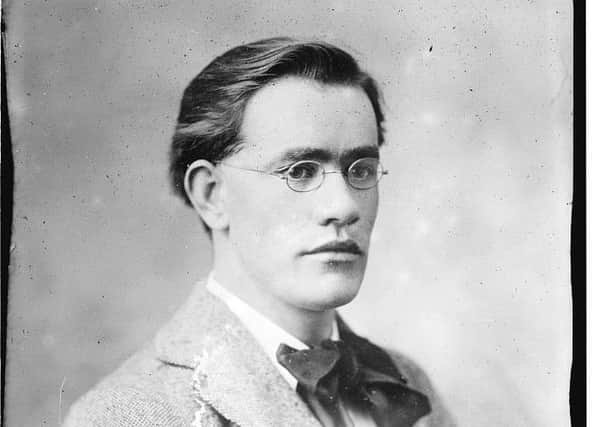Concert will celebrate life of Inniskilling Fusilier and war poet


Another is being marked in Enniskillen on Thursday July 20.
Francis Ledwidge was born on August 19, 1887, the eighth of nine children born to farm labourer Patrick and his wife Anne Ledwidge.
Francis was brought up in the family cottage at Janeville just outside the village of Slane in the Boyne Valley, some 30 miles north of Dublin.
Advertisement
Hide AdAdvertisement
Hide AdHe served and died with the 1st and 5th Royal Inniskilling Fusiliers, leaving an extraordinary legacy of vivid and often deeply moving poetry.
Christened Francis Edward but known as Frank to his family and friends, the fledgling poet experienced hardship from an early age.
His father died when he was just four years old, only three months after the birth of his youngest brother Joseph.
His mother became the main family provider, taking on back breaking agricultural work in the fields for a meagre eight shillings a week.
Advertisement
Hide AdAdvertisement
Hide AdIn his early years Ledwidge was a keen sportsman and amateur actor, and began writing poetry, sponsored by an influential patron, the local aristocrat Lord Dunsany.
Dunsany commended the young poet’s writings -
“I was astonished by the brilliance of that eye that looked at the fields of Meath…with a vividness that made those pages like a magnifying glass, through which one looked at familiar things seen thus for the first time…a true poet, which indeed he was.”
Ledwidge was also extremely active in politics.
Frank and his brother were founder members of the Slane corps of the nationalist Irish Volunteers.
A particularly close friend was a fellow poet, Thomas McDonagh, one of the seven leaders of the Easter Rising in Dublin.
Advertisement
Hide AdAdvertisement
Hide AdWhen WWI broke out Francis enlisted, explaining: “I joined the British army because she stood between Ireland and an enemy common to our civilisation, and I would not have her say that she defended us while we did nothing at home but pass resolutions.”
Ledwidge served with the 5th Royal Inniskilling Fusiliers in Gallipoli and Macedonia in 1915.
In early 1916 he was invalided home with severe rheumatism and during this time McDonagh was executed for his part in the Easter Rising
Ledwidge, profoundly affected by events unfolding in Ireland, served for a time in Ebrington Barracks in Londonderry before being posted to the 1st Royal Inniskilling Fusiliers in Belgium, with the rank of Lance Corporal.
Advertisement
Hide AdAdvertisement
Hide AdOn July 31, 1917, while on a working party near Ypres, he was killed by a shell, and a forthcoming commemorative event in Enniskillen is being held to remember him.
‘Ledwidge; Soldier, Poet’ is a celebratory concert on Thursday July 20 reflecting on the life and death of a writer and soldier through readings of Ledwidge’s poetry and recitals of music inspired by his words.
The evening concert starts at 7.30pm in St Macartin’s Cathedral, Enniskillen, the home of the Inniskillings Regimental Chapel, and will conclude across the street in St Michael’s Church.
Where possible, the performers will be Inniskillings, their descendants or young people from the local area.
Advertisement
Hide AdAdvertisement
Hide AdThe concert will be in two parts; the first will review Ledwidge’s career as a soldier and the second will consider how his military service influenced his writing.
A narrator will introduce readings of Ledwidge’s poetry, recitals of musical settings of his work and of poetry which influenced him such as WB Yeats and Thomas Moore.
There’ll also be short talks about his military career.
The acclaimed local actor and director Adrian Dunbar will draw the evening to a close by reading Seamus Heaney’s emotive poem ‘In Memoriam - Francis Ledwidge’.
John Graham, Inniskillings Museum Trustee and event co-ordinator, summarised the commemoration: “Ledwidge’s story and poetry is as inspiring today as it was 100 years ago when he was killed in Flanders, and it is an honour to bring this special celebration to Enniskillen.”
Advertisement
Hide AdAdvertisement
Hide AdIt promises to be a very moving occasion, supported by the Irish Government’s Department of Foreign Affairs and Trade, the Department for Communities in Northern Ireland and Fermanagh and Omagh District Council.
On July 31 the 1st Battalion of the Royal Inniskilling Fusiliers, of which Frank Ledwidge was a member, were repairing the road to Pilkem near the village of Boezinghe northwest of Ypres.
During the afternoon of that day a shell exploded beside them, killing one officer and five enlisted men, among them the young poet from Slane.
Army Chaplain Father Devas was one of the first to arrive on the scene.
Advertisement
Hide AdAdvertisement
Hide AdThat night the padre wrote in his diary - “Ledwidge killed, blown to bits…”
The men were buried were they fell and reinterred later in the nearby Artillery Wood Military Cemetery.
The cottage where he was born in Janeville is now the Francis Ledwidge Museum, exhibiting original letters, memorabilia and poems such as ‘A Soldier’s Grave’ -
“Then in the lull of midnight, gentle arms
Lifted him slowly down the slopes of death,
Lest he should hear again the mad alarms
Of battle, dying moans, and painful breath.
And where the earth was soft for flowers we made
A grave for him that he might better rest.
So, Spring shall come and leave it sweet arrayed,
And there the lark shall turn her dewy nest.”
l Tickets for ‘Ledwidge; Soldier, Poet’ are free but numbers are strictly limited and may be requested from the Inniskillings Museum at [email protected] or by telephoning 028 6632 3142.